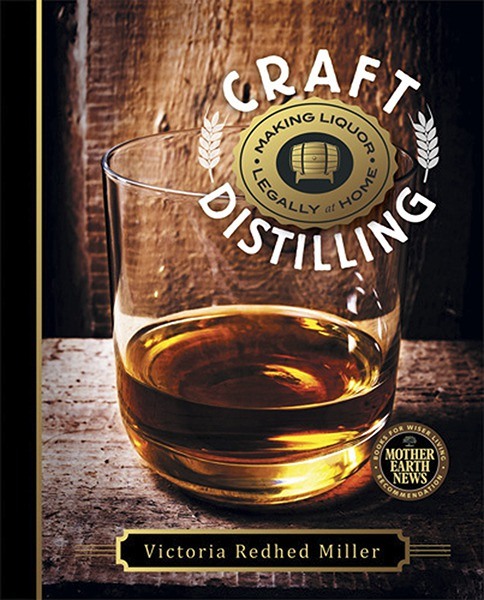As the weather turns from wet to worse in the coming months, one Sequim author recommends you take up a new hobby to wet your whistle.
Victoria Redhed Miller’s latest literary effort turns her attention from birds — “Pure Poultry: Living Well with Heritage Chickens, Turkeys and Ducks” to distilling liquor — “Craft Distilling: Making Liquor Legally at Home.”
For 15 years, Miller has brewed her own beer and made her own wine before she began investigating spirits of the drink variety. She’s not sure what exactly pushed her to pursue making drinks like rum and gin but she said it “felt like the next step for someone who has brewed their own beer.”
Her interest led to writing the book for New Society Publishers, which releases on Jan. 12.
She has numerous local and West Coast book signings and speaking engagements coming up including one from 4:30-5:30 p.m. Wednesday, Jan. 6, at Nash’s Farm Store, 10 a.m.-2 p.m. Saturday, Jan. 9, at Rainshadow Coffee, and more can be seen on her site www.victoriaredhedmiller.com.
Miller’s intent with the book, she said, is “aimed at those who want to make really good-quality spirits, not just cheap or fast booze.”
The logistics are all there with how-to-guides for setting up your own distillery, making different types of drinks and the economics and future of home distilling.
But doing what Miller does hasn’t been exactly an easy process.
In November 2012, Miller applied for a state craft distillery license that allows licensees to make up to 150,000 gallons a year. She was the first person to apply for home use but was told she only could have the license if she was going to do it as a business.
“I was definitely not planning on making that much,” she said. “With the still I have, it automatically limits the amount of booze you can make. You can’t just turn up the heat and have it run faster.”
With her calculations and running 24/7, she might come close to 100 gallons a year, she said.
After several back-and-forths with state and local officials, she was given the solution of posting a notice on her front door about installing a distillery. However, she lives a few miles from neighbors off the grid with her husband David, so any possible objection was moot.
By the book
Despite living in the countryside, Miller wanted to do things legally.
In Washington, you must have a state license and federal permit, but she found most of the state laws date back to 1933 when Prohibition was repealed.
While Miller isn’t surprised to run into road blocks initially because she was one of the first people to inquire about this home use, she finds the process unfair.
“What are the government’s interests? We’ve been able to make beer and wine since 1978?” she said.
At all her presentations, she’s asked numerous times, “How can I make beer and wine but not distilled liquor?”
She outlines a solution in the book where she wants everyone to “work together on a solution everyone is happy with.”
Miller said the state’s concerns are two-fold: safety and tax revenues.
With safety, state officials, she said, are concerned around the risk of fire and explosion because the first things that come out are nearly pure alcohol. Her solution is creating a class where safety concerns can be addressed.
She also debates how much revenue the state would lose to home brewing.
“They’ll say if people start making it, then they’ll stop buying it and lose all this tax revenue but I could run my still and not make that much booze,” she said.
“Everything about my proposal hinges on limiting the size of the still and how much booze you can make.”
Miller said she and her husband still buy spirits and that’s because “I haven’t come up with something that’s the equivalent of 18-year-old scotch yet.”
Going forward
Following the privatization of liquor sales in Washington, Miller said she’s found it harder to find certain brands that state-run stores used to stock.
At grocery stores, she suspects they only have so much shelf space for top selling brands opposed to niche drinks.
Several reports state Washington pays more for liquor now than pre-I-1183 with a higher tax-rate on liquor and that fewer consumers are buying it.
In the U.S., Washington residents pay the most for liquor at an average of $35.22 per gallon for spirits followed by Oregon at $22.73 per gallon, according to The Tax Foundation.
She said the same thing happened in 1862 when President Abraham Lincoln brought back liquor taxes to help pay for the Civil War, which led to more bootlegging businesses.
“They were buying less, so the government lost a lot of money,” Miller said.
Miller said New Zealand is the only country in the world to allow liquor distilling without a license because the country was paying more to prosecute people than the cost of the penalty.
“They made a simple amendment and it ended up being win-win for everyone,” she said.
Miller is in discussion with state Rep. Kevin Van De Wege about some possible legislative action but is waiting to hear back about the 2016 session.
“It’s a matter of convincing the powers that be that no matter how much I make I’m still buying it,” she said. “It’s a hobby and no one is doing this full time.”
Pre-order “Craft Distilling: Making Liquor Legally at Home” from newsociety.com and other online retailers.
For more information on Victoria Redhed Miller, visit www.victoriaredhedmiller.com.


